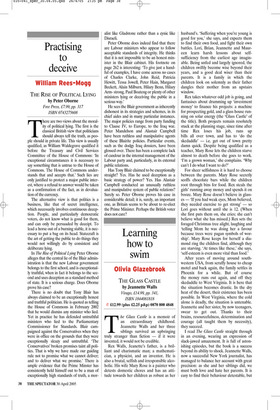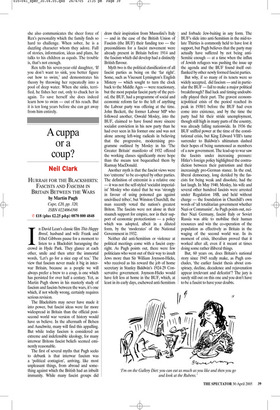Learning how to swim
Olivia Glazebrook
THE GLASS CASTLE by Jeannette Walls Virago, £14.99, pp. 341, ISBN 1844081818 ✆ £12.99 (plus £2.25 p&p) 0870 800 4848 The Glass Castle is a memoir of an extraordinary childhood. Jeannette Walls and her three siblings survived an upbringing truly stranger than fiction — if it were invented, it would not be credible.
Rex Walls, Jeanette’s father, is a brilliant and charismatic man; a mathematician, a physicist, and an inventor. He is also a brutal, selfish and irresponsible alcoholic. His wife Mary Rose is a painter who detests domestic chores and has an attitude towards her children as robust as her husband’s. ‘Suffering when you’re young is good for you,’ she says, and expects them to find their own food, and fight their own battles. Lori, Brian, Jeannette and Maureen learn harsh lessons about selfsufficiency from the earliest age imaginable. Being unfed and largely ignored, the children swiftly become wise beyond their years, and a good deal wiser than their parents. It is a family in which the children look on solemnly as their father dangles their mother from an upstairs window.
Rex takes whatever odd job is going, and fantasises about drumming up ‘investment money’ to finance his projects: a machine for prospecting gold, and a glass house running on solar energy (the ‘Glass Castle’ of the title). Both projects remain resolutely stuck at the planning stage, since time after time Rex loses his job, runs up bills all over town, and has to ‘do the skedaddle’ — i.e. get out of town pretty damn quick. Despite being qualified as a teacher, Mary Rose lets the children starve almost to death before she goes to work. ‘I’m a grown woman,’ she complains. ‘Why can’t I do what I want to do?’ For sheer selfishness it is hard to choose between the parents. Mary Rose secretly scoffs chocolate bars while the children root through bins for food. Rex steals the girls’ running away money and spends it on booze. Mary Rose doesn’t believe in glasses — ‘If you had weak eyes, Mom believed, they needed exercise to get strong’ — so Lori goes without until she is 12. (When she first puts them on, she cries; she can’t believe what she has missed.) Rex sets the foraged Christmas tree alight, laughing and ‘telling Mom he was doing her a favour because trees were pagan symbols of worship’. Mary Rose keeps for herself a diamond ring the children find, although they are starving. ‘At times like these,’ she says, ‘self-esteem is even more vital than food.’ After years of moving around southwestern USA, from scruffy house to cheap motel and back again, the family settles in Phoenix for a while. But of course the money runs out again, and off they skedaddle to West Virginia. It is here that the situation becomes drastic. In the dry heat of the desert, their existence has been possible. In West Virginia, where the cold alone is deadly, the situation is untenable. Jeannette and her sister, by now teenagers, swear to get out. Thanks to their brains, resourcefulness, determination and courage (all taught them by necessity), they succeed.
I read The Glass Castle straight through in an evening, wearing an expression of slack-jawed amazement. It is full of astonishing episodes, but the book is a success beyond its ability to shock. Jeannette Walls, now a successful New York journalist, has managed to balance her account with great precision: as she and her siblings did, we must both love and hate her parents. It is easy to find their behaviour detestable, but she also communicates the sheer force of Rex’s personality which the family finds so hard to challenge. When sober, he is a dazzling character whom they adore. Full of stories, information, ideas and plans, he talks to his children as equals. The trouble is, that’s not enough.
Rex tells his seven-year-old daughter, ‘If you don’t want to sink, you better figure out how to swim,’ and demonstrates his theory by throwing her repeatedly into a pool of deep water. When she sinks, terrified, he fishes her out, only to chuck her in again. To save herself she does indeed learn how to swim — out of his reach. But it is ten long years before she can get away from him entirely.





















































 Previous page
Previous page